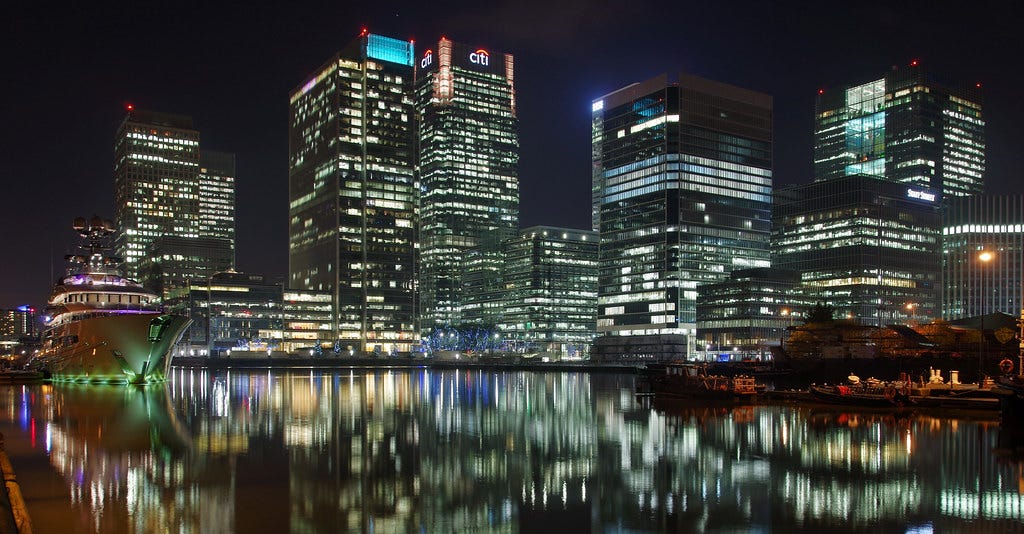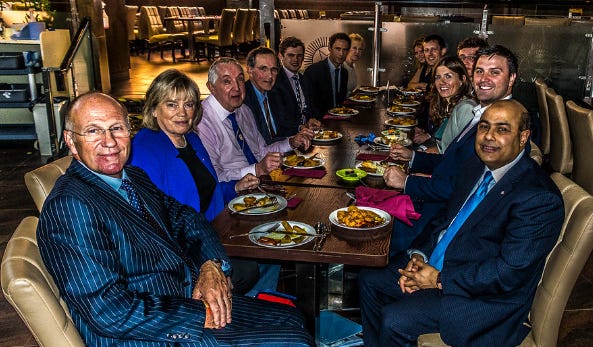It’s the stupid economy, stupid! - October 2022
Another frantic and chaotic month for our un-representative democracy. As warned, October was a rough ride for government, markets and citizens.
The Twilight of Sovereignty was published in September 1992. Exactly 30 years later its message came full circle and destroyed free market zealot Lizzz Trusspot, her Chancellor Kamikwasi Kwarteng and possibly the entire Conservative party.
On publication, the author Walter Wriston, was CEO of CitiCorp and was widely regarded as the single most influential commercial banker of his time. His message was clear. With the cybernetic revolution, the world entered a new era of unrestrained information, in which only the global market could be said to be sovereign.
Nations could no longer fully control information or even its own money. When the market opens in London it is open to the world at the same time. National boundaries are increasingly irrelevant, and the traditional power and perquisites of sovereignty are disappearing. The effect of this revolution, said Wriston, is the formation of a new global democratic order.
A New Order
You may have noticed this new order in action when in 2008 democratic governments worldwide bailed out their banks and bankers who had gone bust in the casino of sub-prime mortgages. In the UK, as of October 2021, the OBR reported the current cost of these interventions was £33 billion.
You may have noticed this new order in action when in 2020 the UK government bailed out the economy to the tune of £350+ billion. The pandemic necessitated some action to help ordinary people and smaller businesses. But as former trader Gary Stevenson Tweeted, there was a more egregious side to the Quantitative Easing.
You may have noticed this new order in action when this month, “finance” and the “market” turned on Truss and Kwarteng over their mini-budget. Yes, the mini-budget was a reckless, ideologues pipe dream of how to pursue growth on a small island off the north Atlantic. But it provided a clear example of who really runs the world. Finance.
The Old Boys Club
Who is Finance? One could say it is hundreds of thousands of individuals worldwide, who would say that they work in “finance”. Be it investment banking analysts, accountants, financial services workers, securities or commodities traders. It could also be the billions of individuals who exist within a capitalist country in a capitalist world system.
Should Direct Democracy favour such an decentralised meritocratic formulation? If only it was a meritocracy! Finance remains one of the strongest and strangest of “old boys clubs”. In 1973 women were admitted to the Stock Exchange for the first time in the institution's 200 year history. The famously boisterous London Metal Exchange, which provided a market for buying and selling metals since 1877, gained and lost its first female trader of the modern era in the 2010’s.
It is not just women who are underrepresented in banking and financial services. A 2018 report by Randstad found that “fewer than one in 10 management jobs in the UK were held by members of the black, Asian and ethnic minority (BAME) community”. At the time Randstad found that just 54% of FTSE 100 companies were actively championing greater diversity.
Such steep and impenetrable walls facilitate and continuate global financialisation that destroys lives, the natural world and even whole countries.
Democratising Finance
Financial systems move the world's savings from investment to investment, chasing the highest rates of return. But what if investment went to the enterprises or institutions that provided things that the majority of people would prioritise?
Finance capitalism has generated a litany of social ills: upward redistribution, poor growth, increased worker precarity, instability and ecological decimation. Since the Great Recession, the call to democratise finance has animated activists, planners and technologists to design alternative systems of credit and investment allocation. Many financial futurists see decentralisation as key to a more desirable alternative. Finance’s concentration has only deepened since the 2008 downturn, as asset managers like BlackRock and Vanguard are now the dominant shareholders in the world economy.
Public banks run by deliberative minipublics can fundamentally transform finance. Banking no longer needs to be based on extraction and short-term gain. Instead, public banks can invest and lend credit for the social good. Direct Democracy UK would set up a National Investment bank that would create money to invest in housing and public transport, once described as "People's Quantitative Easing".
Who Voted For This?
Lizzz Trusspot started the month with her first and last leader's speech at the Conservative Party Conference. Chaotic scenes occurred outside and inside the conference centre as protesters harassed spads, wonks and MPs outside with abuse and piped music. While Greenpeace protestors interrupted Trusspots speech inside, asking the question on everyone’s lips “who voted for this?”
Chancellor Kamikwasi Kwarteng’s tin-eared conference speech did little to calm the markets his mini-budget had so upset. With mortgage products being withdrawn in their hundreds and the Bank of England offering billions to save pensions, the pressure on Trusspot sought an escape valve and she quickly sacked her chancellor for implementing the financial plan that they cooked up together. KKK had to fly home early from the IMF in New York only to discover his fate at 36,000ft.
The International Monetary Fund, which usually reserves its sermonising for developing economies, had said: “we do not recommend large and untargeted fiscal packages at this juncture, as it is important that fiscal policy does not work at cross purposes to monetary policy. Furthermore, the nature of the UK measures will likely increase inequality.”
The new Chancellor, Jeremy Hunt, delivered an emergency statement to the Commons, in which he announced that the government "will reverse almost all the tax measures" from the mini-budget. The reconfigured budget will raise £32bn, out of the £70bn needed to close the funding gap. “Truss-onomics” was dead and so was her premiership as it was clear to all who was really pulling the strings in Downing Street.
Sadist Cruella Braverman resigned as Home Secretary, and the next day Trusspot made the fateful walk from black door to Jenga lectern to announce her pending resignation as Prime Minister after just 45 days. Her tenure was the shortest of any Prime Minister in UK history. Chaos reigned as the UK was set for its third Prime Minister in three months.
Not Another One!
This time the 1922 Committee was not going to repeat the mistake of letting the insane gerontocracy of Conservative members choose the next PM. High barriers to entry were erected with the potential for a new leader to be confirmed in 4 days. Those barriers proved too high for Boris Johnson and Penny Mordor with both pulling out in the final hours and minutes of the contest. Rishi Sunak was duly appointed leader of the Conservative and Unionist party and thus Prime Minister - the first British Asian and first Hindu to hold that position.
Sunak had made no public statements during the process, preferring instead to secure the public backing of 193 MPs. In another affront to democracy, the number of people “electing” the Prime Minister, fell further still.
July 2019 Boris Johnson - 92,153 Conservative party members
September 2022 Liz Truss - 81,326 Conservative party members
October 2022 Rishi Sunak - 193 Conservative MPs
If the ballot had been extended to the membership, pollings suggested Boris Johnson would have won - easily. Sunak, who gained the support of 60,399 Conservative party members when competing against Trusspot, inherits a divided parliamentary party, a disenfranchised membership and a depressed nation.
I was in Sunak’s constituency on the day his leadership was confirmed. In the White Swan Inn, Stokesley, customers hoped for competency and calm. Some were aware that Sunak had recently spent thousands building a private pool at his £1.5 million Richmond home, while locals face a public baths closure, due to utility price rises.
Sunak, whose family wealth of £730 million, makes him the first PM to be appointed by a monarch poorer than him. He will enjoy a slight polling bounce, thanks mainly to Trusspot’s incredibly low numbers. But many believe he is too rich to understand and empathise with a nation of households battling a cost of living crisis.
TraumaZone
An Empire has been lost. The economy is collapsing. Politics isn't working. Society hangs by a thread in Food Banks and Warm Spaces. The people have lost faith in democracy. Billionaire owned media attempts to ride a new reactionary wave, but only to preserve their vested interests. The environment is polluted as big business announces record profits. Leaders warn of tough decisions to come…
I'm talking of course about Russia, before, during and after the fall of Communism, as depicted in TraumaZone Adam Curtis' latest series for iPlayer.
News reports at the time and subsequent documentaries attempted to portray the events of those chaotic years, but not like this. Nothing like this. What strikes you first is the dirt. Every inch of late 1980s Russia seems ingrained with it. Huge brutalist metal machines are omnipresent as cakes, coal and cars are produced in line with "The Plan".
The plan however had clearly failed and the economy was falling apart. But everybody had to play along and pretend that it was working because no-one could imagine any alternative. One Soviet writer called it "hypernormalisation". You were so much a part of the system that it was impossible to see beyond it.
Lacking both a deliberate soundtrack and voice over, TraumaZone is even more haunting because of this lack. It is as if you have fallen into a dark room in the BBC archives with only the light of a TV screen to guide you through 14 years of chaos and horror.
The criminality and barbarism is more shocking than anything I have ever watched and is a chilling reminder of what human beings are capable of doing when experiencing collapse. Putin is currently priming the world for a false flag dirty bomb attack in Ukraine as a precursor to his own military’s use of nuclear weapons.
A senseless war, far from home, may yet again help revive the fortunes of the Conservative party. Sunak has two years to turn things around. Delaying a General Election is essential for the party’s very survival.










